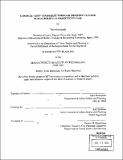Complete "and" cooperate through industry cluster public policy : a Connecticut case
Author(s)
Kobayashi, Yoko, 1974-
DownloadFull printable version (7.855Mb)
Other Contributors
Massachusetts Institute of Technology. Dept. of Urban Studies and Planning.
Advisor
Karl Seidman.
Terms of use
Metadata
Show full item recordAbstract
Even though the cluster-led economic development has received wide attention among policy makers since the 1900s, the ways it is implemented has been questioned by several researchers. One of the criticisms is that policy makers lack the understanding of specific causes of companies to cluster. Therefore, my thesis examines whether the public sector can enhance competitiveness of industries through the cluster-led economic development policy. More specifically, I analyze the Industry Cluster Initiative in Connecticut from the perspective of industries' competitive situation, using the BioScience Cluster and the Aerospace Manufacturing Components Cluster as cases. I use the analytical framework that I developed based on the following theories, which explain why companies cluster: theories of agglomeration economies and what I call "new theories of competition." This framework examines three dimensions of industries: (1) competitive situation, (2) drivers for clustering, and (3) the need of policy supports. I also examine how the public sector (state of Connecticut) responded to the industries' needs. The main findings are that first, clustering is one way for companies to effectively respond to their respective competitive situation. Second, the public sector can effectively support the competitive strength of industries and critical roles are: (1) to encourage creating cluster organizations through which companies start collaboration, and (2) to provide a menu of public sector supports that are available for companies in respective clusters according to their priority needs. This menu addresses both: (1) cluster specific issues, and (2) cross-cutting economic infrastructure issues. Ultimately, my argument is that when the clustering makes economic or strategic sense, the industry cluster approach can be an effective strategy for the public sector to promote the development of the industry. Finally, I suggest policy implications and areas for future research: other forms of competition in the global economy, possible trade-offs among activated clusters, difference between cluster organizations and trade associations, possible mismatch between political and economic boundaries, mechanism to align related departments, and merit of choosing the industry cluster approach over other economic development strategies.
Description
Thesis (M.C.P.)--Massachusetts Institute of Technology, Dept. of Urban Studies and Planning, 2001. Includes bibliographical references (leaves 87-89).
Date issued
2001Department
Massachusetts Institute of Technology. Department of Urban Studies and PlanningPublisher
Massachusetts Institute of Technology
Keywords
Urban Studies and Planning.